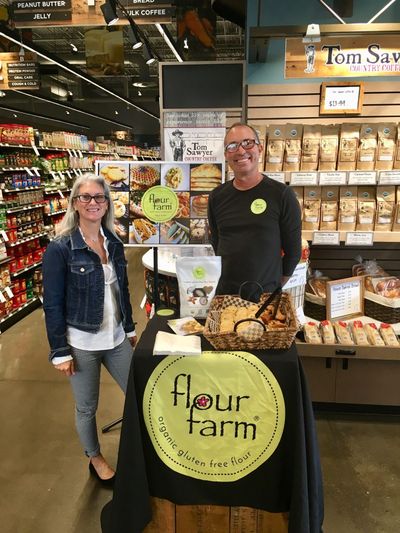Spokane duo aims to show gluten free not that bad

What happens when an experiment with a gluten-free pastry becomes a customer favorite?
For Dave DuPree and Teri Delany, the answer was to take on a whole new business venture.
Flour Farm, a fully-certified organic, gluten-free flour blend, started in Delany’s kitchen as she worked to improve the hand pies sold at DuPree’s businesses. Over the past three years, it has grown into a booming business, now available online, in local natural markets and in the future, at stores across the country.
Delany said the wheat flour version of the hand pie – a pastry filled with savory selections such as ham and cheese – had to be produced daily because the wheat didn’t freeze and reheat well overnight.
“So I made a gluten-free version,” she said. “I couldn’t keep up with the production,” the new and improved hand pies became such a hit.
That’s when the idea struck the Spokane natives to produce their own gluten-free flour that is certified organic but, just as importantly, tasted great.
“Our gluten-free doesn’t suck,” DuPree said.
DuPree said they tried a variety of gluten-free options, such as potatoes and lentils, to keep the sourcing local, but many just didn’t work. What they wound up with was a five-ingredient blend. Almost 60 percent of the blend comes from sweet white rice and brown rice sourced from Northern California. The other 40 percent comes from Sicilian almonds, coconuts from the Philippines and tapioca sourced from Thailand.
“We couldn’t get all the ingredients local, and they are all there for a specific reason,” Delany said.
For example, the coconut keeps the moisture so it doesn’t turn into crumbles and the almonds have a more intense flavor. It is all milled superfine at HB Specialty Foods in Nampa, Idaho, to eliminate the grit that is common in gluten-free products, Delany said.
Over the years, Delany and DuPree have taken it upon themselves to visit each of the fields, factories and producers they work with personally to verify their supplies are organic and match the same integrity they have ingrained in their company.
Taking from their drive to know where their product comes from, they also want to know where it is going, which means they are visiting individual stores before their product’s fully recyclable bags hit the shelves. So far, 30-ounce bags are available online through Amazon for $14.49 or at My Fresh Basket for $13.99, and the 30-ounce bag as well as a bulk-size product are now available at Huckleberries.
“We want to have fun, not just blow ourselves up,” DuPree said. “These natural, small markets are the future, we think.”
In the future, they hope to expand into other avenues for the product, such as wholesale manufacturing or a line of products that have all the ingredients to make a recipe, such as a batch of cookies, in one bag.
Delany added that while she loves seeing the product in stores, the added bonus to purchasing online is that half of the sales goes to Second Harvest, a Spokane nonprofit food bank. And she hopes they can expand that offering in the future to include more programs that provide food to children in need.
Delany said as parents, they know it can be hard to fully understand exactly what is being fed to their children.
“Wheat rules the world of food. Wheat is great, but not in everything,” DuPree said, adding wheat makes up 60 percent to 70 percent of the average American’s diet. The gluten was increased for production needs, not for health, and it is extremely hard for the human body to digest, he said.
“What we put in is what we get out,” Delany said. “I wasn’t going to create a product that feeds that beast.”
Education and access to healthy diet options were other major drivers behind the decision to sell both the Latah Bistro and Latah Latte, which DuPree had owned since 2004, to longtime customers and friends in April.
“It was really time,” Dupree said of the sale. “I want to give my all to this.”
And what Flour Farm will be giving a large portion of their time to is defusing the stigma that surrounds the words “gluten free.”
“Our two main issues is that ‘gluten free sucks’ and it is expensive,” he said. “We are trying to change a large paradigm here.”